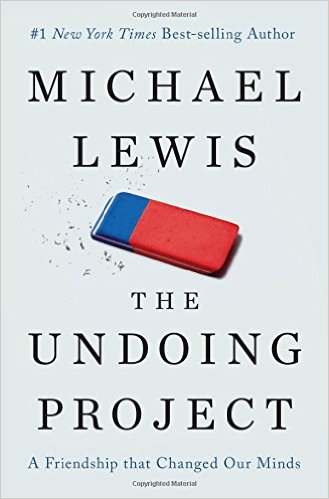The Undoing Project:
A Friendship That Changed Our Minds
by Michael Lewis
–Review by Teri Hyrkas
The Undoing Project: A Friendship That Changed Our Minds (W.W. Norton & Co., 2017) by Michael Lewis is, at its heart, the story of an intense rapport between two men, Daniel Kahneman and Amos Tversky. I say, “at its heart” because even though the word friendship is in the title, it is not immediately clear that the topic of the book is friendship, especially when the first chapter is about baseball statistics. But yes, The Undoing Project is a story of a very deep friendship between two non-religious Jews who as young men lived in the newly formed State of Israel. Kahneman and Tversky studied psychology and graduated from Hebrew University of Jerusalem within a few years of each other. After college the fledgling scientists, who only knew each other slightly at this time, each sought to develop fresh ideas in their respective fields of cognitive and mathematical psychology.
The two researchers had a lot in common career-wise but their personalities were light years apart:
Daniel’s childhood had been spent in Nazi occupied France where he learned to trust no on; as a result he made no friends in school. His tremendous intellectual acumen and gentle demeanor combined with a lack of physical coordination compounded his isolation, and, says the author, Daniel never overcame his struggles, even as an adult. As far as Tversky’s childhood, writes Lewis, Amos grew up in Israel and although slim and boyish-looking, he was fearless – a decorated war hero at nineteen years old. Amos was: “[The] last to go to bed at night, the life of every party, the light to which all the butterflies flew, and the freest, happiest, and most interesting person anyone knew,” writes Lewis. Tversky was also widely considered to be the smartest guy in the room as Lewis’ collection of comments from Amos’ friends and professional peers attests.
Lewis writes that the Tversky-Kahneman collaboration began a few months after Daniel invited Amos to be a guest lecturer at a seminar at Hebrew University in the spring 1969. After Amos’ lecture, Lewis records that Daniel responded to Amos by saying, “Brilliant lecture, but I don’t believe a word of it,” and then proceeded to dismantle the lecture. This was the beginning of a change in Tversky. Writes Lewis, “[That] day something shifted inside Amos. He left Danny’s seminar in a state of mind unusual for him: doubt. After the seminar he treated theories that he had more or less accepted as sound and plausible as objects of suspicion.”
In the fall of that same year, the two entered into a wholehearted friendship which was so intense that Kahneman referred to their relationship as being “twinned.”[1] That they could work together constantly and closely over the course of ten years seems remarkable considering their personalities were so dissimilar. In the following paragraph Kahneman describes what their conversations were like:
“We were quicker in understanding each other than we were in understanding ourselves. The way the creative process works is that you first say something, and later, sometimes years later, you understand what you said. And in our case it was foreshortened. I would say something and Amos would understand it. When one of us would say something that was off the wall, the other would search for the virtue in it. We would finish each other’s sentences and frequently did. But we also kept surprising each other. It still gives me goose bumps.”
As a result, Kahneman and Tversky’s thinking led to ideas which altered prevailing notions in the psychology of decision making and produced a new field of “behavioral economics” called “Prospect Theory.” Lewis continues: ” ‘Prospect Theory,’ scarcely cited in the first ten years after its publication, would become by 2010, the second most cited paper in all of economics.” Lewis notes that Kahneman and Tversky’s body of work continues to influence areas as diverse as politics, medicine, professional sports, and economics.
Lewis’ account of the collaboration of Kahneman and Tversky includes the good, the bad and the ugly of the pair’s relationship. Kahneman in particular seemed to harbor insecurities and vexations about the honors that Tversky’s brilliance garnered. The two alternated the lead authorship on their papers and projects, and could not identify what their own specific contribution was to any given project, yet somehow the credit for their work almost always fell to Amos. This was intensely frustrating to Daniel. He knew he gained tremendously from his relationship with Amos, and acknowledged as much in a letter in which he wrote that “he could never have achieved on his own what he had achieved with Amos.” Nevertheless, Lewis records that Daniel could not make peace with the lack of recognition from his peers and esteemed scientific societies, and this eventually drove the two friends apart.
The Undoing Project: A Friendship That Changed Our Minds by Michael Lewis is a riveting book about the complex subjects of love and the human susceptibility to error in decision making. Lewis said in an on-line interview on December 18, 2016, with Richard Feloni of “Business Insider,” that he chose to write this book because of, “1.The sheer level of interest of the two main characters: Danny Kahneman and Amos Tversky… And 2. The peculiar passionate relationship between them, which was a love story without the sex. Their children were ideas…. to have this emotionally super-charged relationship generating these cool intellectual insights I thought was kind of interesting.”
Interesting indeed. The final chapters of The Undoing Project are stunning; they are an illustration of how fallible and unpredictable human life can be. The Undoing Project would be a terrific book club selection for those interested in psychology, mathematics, or relationships.
[1] Goode, Erica (5 November 2002). “A Conversation with Daniel Kahneman; On Profit, Loss and the Mysteries of the Mind”. The New York Times. Retrieved from Wikipedia 20 January.2017.


Sounds good. I’ve got to read it.